Human rights activist's journey through two eras of Dr M
MALAYSIANSKINI | In March 2018, human rights activist Yap Swee Seng became the first-ever executive director of Bersih, an organisation that has been instrumental in bringing the expression of public dissent to the mainstream.
But Yap's activism started long before Bersih, including a stint with NGOs Suaram and Bangkok-based Forum Asia.
When he became Bersih’s executive director, little did he know that the decades-long work by activists like him was about to bear fruit.
Two months later, the six-decade-long hegemonic rule of BN and Umno came to an abrupt end in the 14th general election.
"I didn't believe that there would be a change of government, what more with Dr Mahathir Mohamad as the prime minister," he told Malaysiakini in an interview.
Yap's foray into human rights activism began when he joined the Youth section of the Selangor Chinese Assembly and co-founded the Civil Rights Committee of the Kuala Lumpur and Selangor Chinese Assembly Hall after graduating from Universiti Sains Malaysia in 1994.
Yap, as the executive editor of Rosa Sinesis in 1996, a journal published by a resource centre which was later known as the Centre for Malaysian Chinese Studies, recalled how the mere criticism of Mahathir – who was then the fourth prime minister – could spark an uproar.
The Chinese journal had published an article by writer Chen Kin Pa titled "Phallus and the blossom: A feminist critique of space and power" which criticised Mahathir's ambitions for mega towers.

Yap resigned after his chief editor Tang Ah Chai was transferred, and the publication's board of directors hit the panic button for fear of upsetting the Home Ministry, whose deputy at that time was MCA president Ong Ka Ting.
He had another brush with the authorities just months later when Umno Youth stormed the Asia-Pacific Conference for East Timor II on Nov 9, 1996, and attendees and journalists there were arrested by police.
Then-Umno Youth secretary Saifuddin Nasution Ismail, who led a mob to gatecrash the event, admitted that he was instructed by then deputy home minister Megat Junid Megat Ayob, in consultation with Mahathir, to disrupt the event and pave way for a crackdown.
Yap, who was among those arrested, said he experienced firsthand what it was like to be sleep-deprived in an overcrowded and filthy lockup for four days.
Thirteen years after the incident, 29 of the participants were each awarded RM30,000 for wrongful arrest in 2012.
Reformasi: A pivotal event
Yap was in 1998 attached with human rights group Suaram, and along with several other activists, provided legal aid to participants of widespread demonstrations sparked by the sacking of then-deputy prime minister Anwar Ibrahim.
Reformasi was a pivotal event, he observed, as for the first time, many Malays were openly dissenting against the government which had detained Anwar and his supporters without trial under the now-defunct Internal Security Act 1960.

At the time, he said there were reservations in civil society about working with Anwar and former Umno leaders due to their track record.
Almost two decades later, similar questions arose when Mahathir joined the opposition in 2016.
Some people credit Mahathir for the change of government on May 9, but Yap believes it would not have been achieved without civil society having chiipped away at the hegemonic power of the old regime.
Here, in Yap’s own words, is his story.
WE ALL KNOW THE PAST RECORD OF MAHATHIR. When he was appointed as the prime ministerial candidate, we all struggled. We had fought him for so long and we know how cunning he is. He can be ruthless against his enemies.
WHAT WE HAVE BEEN CONSISTENTLY AGAINST IS THE ONE-PARTY SYSTEM, not Mahathir. You can continue criticising him, but at the same time, we also know that without Mahathir, it is difficult for opposition parties to get Malay support.
From 1998 to 2018, Anwar tried many times. He was jailed twice and spent most of his life in prison but was still unable to win the majority of Malay support. He probably could not get support from within the system.
WE THINK WE’RE INDEPENDENT. But BN was too strong and controlled all resources. Even distributing pamphlets and hanging banners could lead to arrests. It was very difficult. Therefore, joining forces (with those aligned against BN) was the best strategy.
A LOT OF PEOPLE DESCRIBED GE14 AS A 'MAHATHIR TSUNAMI', but I disagree. Reformasi played an important role, and the struggle of NGOs was also vital. From 2008 to 2013, we gained more and more of the popular vote and by 2018 – BN collapsed.

THE DEMOCRATIC DEVELOPMENT IN MALAYSIA IS RELATIVELY SLOW because of its complexity in terms of race and religion. We took a softer approach to the struggle, so we needed a longer time to achieve it. If not, it would have turned into a racial confrontation.
MALAYSIA'S PROGRESS IS CONSIDERED AVERAGE. Thailand has completely fallen backwards and is controlled by the army while the opposition parties are silenced; the opposition parties in Cambodia are dissolved; and Vietnam is ruled by a single party.
Myanmar is also controlled by the army even though the opposition party has won power. The Philippine President Rodrigo Duterte has openly condoned the killing of so many people, which shows a great retrogression.
THE ACCUMULATION OF RESULTS (of democratic progress) that grows bigger helps sustain everyone to press on with our struggle, without which it would have been exhausting.
THE MOST IMPORTANT THING IS TO STILL BELIEVE IN HOPE. I will continue on this journey but I can't keep doing this continuously. I need some breaks (from time to time), like studying or travelling. It's only been over 20 years – not a very long journey.
This interview was originally conducted in Mandarin.
MALAYSIANS KINI is a series on Malaysians you should know.
PREVIOUSLY FEATURED
Patriot’s Arshad defends country by speaking out against corruption
'I'm very clumsy, I fell into stand-up comedy'
Why Nasa scientist Amani chose M’sia over the stars
Working hard to revitalise country’s traditional arts
Living life in the face of muscular atrophy
Lighting the way for neglected girls
The rebel educator who seeks to enlighten people
Rendering aid to the Rohingya through education
Bringing a ray of hope for refugee children
M’sia's first woman BRT captain drives her way to top
The real Orked remembers sister Yasmin's life and career
RM12.50 / month
- Unlimited access to award-winning journalism
- Comment and share your opinions on all our articles
- Gift interesting stories to your friends
- Tax deductable

